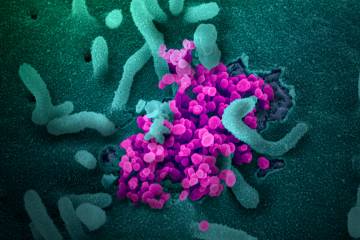Until recently, it seemed that COVID-19 was largely sparing children from critical and even mild illness. Then in April, doctors in Europe began connecting a constellation of symptoms in sick children to what is now known as multisystem inflammatory syndrome in children, a rare and dangerous disease thought to be caused by an immune reaction to SARS-CoV-2, the virus that causes COVID-19.
The disease can cause inflammation of the heart, lungs, kidneys, brain, skin, eyes, and digestive system, according to the U.S. Centers for Disease Control and Prevention. It can be fatal, but most children recover after treatment and hospitalization. Part of what is so confounding about the disease is how difficult it is to predict. When children contract COVID-19, they rarely show symptoms, making it difficult for parents to know whether they've been infected.
Lasya Gaur, a pediatric cardiologist at Johns Hopkins Hospital, spoke with Public Health on Call, a COVID-19–themed podcast produced by the Bloomberg School of Public Health. An expert in Kawasaki disease—a similar condition that causes inflammation of the heart in children—she discusses what health care professionals do and don't know about this disease, the symptoms parents should look out for, and which treatments have been helpful for children who become ill. Read the full transcript of the episode, recorded on May 22, below.
Up until recently, it looked like COVID-19 was sparing children completely, and now doctors are seeing this multisystem inflammatory syndrome in some children. First I'd like to know: How do we know that it's linked to COVID-19?
So, yes, I think you're asking the right questions. Unfortunately, the one silver lining we thought we had, which was that kids were somehow spared—at least physically—from COVID-19, has now been completely turned on its head. While the vast majority of kids with this virus do very well, we're just learning now that there is a small subset that gets very sick. And as our listeners have probably seen in the news and on social media, there is a newly described syndrome in children that we believe is related to COVID. It's called the pediatric inflammatory multisystem syndrome. Some people abbreviate that as PIMS, but the CDC recently renamed that to multisystem inflammatory syndrome in children, MIS-C. And I guess this is new enough that we don't even, as a medical community, have a name for it, but I'd love to provide some background on this.
As people have seen, on April 26 of this year, doctors in the United Kingdom reported this mysterious illness that is affecting previously healthy children. And then in late April to early May, we started seeing emerging reports from New York supporting a similar illness in children. And that was seen almost exactly one month after their peak COVID-19 infection in the state. They've reported up to 150 cases so far since the first few cases were reported in late April and counting. Overall in the United States, at least 19 states have reported this illness. In our own mid-Atlantic area, we've had four cases in Maryland; Washington, D.C., has had about 23 cases; and I suspect we're going to continue to see a little bit of an uptick.
I think you asked about how we know it's related to COVID. One of the things we've seen in all of the rapidly emerging studies is that we have two ways to know if this is related to COVID. We have two ways of testing. One is to test directly for COVID viral particles—that's the nose swab test that people have heard about—and the other is a blood test. The purpose of the blood test is to look for specific antibodies that tell us that the child has had COVID infection sometime in the preceding few weeks before they came to us sick with the suspected syndrome. Based on the studies that are emerging from Europe and New York—these are areas that obviously hit their COVID peak before us here in the mid-Atlantic—most kids have evidence of these antibodies to COVID even if they have a negative nose swab when they come in with this illness. So the thought is that once these children get an either asymptomatic or very mild COVID infection, their bodies have this immune response that just goes into overdrive and triggers this cascade of events that then attacks their own organs. And it has them presenting in this multisystem organ failure or MIS-C syndrome that we're now noticing in kids.
Once these kids get sick, does it just happen really quickly? And what kind of symptoms do they have?
Great questions. These kids do get sick rather quickly, from what we've seen so far, from what we know. But there are some patterns, and I'd really like to highlight those. The most common presenting symptoms are high fever and in children, gastrointestinal complaints. One study has reported up to 80% of children have sort of a persistently high fever and gastrointestinal issues such as abdominal pain, vomiting, or diarrhea. Some people have actually thought that this represents an illness similar to acute appendicitis, but it ends up being this COVID-related syndrome or MIS-C. Other symptoms that people should look for are significant lack of energy, significant weakness, loss of appetite, or, you know, kids just don't act like themselves. We've seen associations with rash, conjunctivitis, or bloodshot eyes in children. The whole syndrome is actually a sort of a constellation of all of these presenting signs and symptoms, with fever and abdominal pain being the most prevalent and concerning.
I think that most parents were feeling confident that COVID-19 was not going to be deadly to their children, so how worried should we be? I know it's relatively rare at this point. Should we be worried? What should we watch for if our children may have been exposed to COVID?
As a parent and as a pediatrician and pediatric cardiologist, if there's one thing I know, it's impossible to tell parents not to worry. My message to parents—myself included—is to remember that this is very rare. Even in areas that have had large numbers of COVID infections, we are still seeing small numbers of kids with this illness. We still don't know enough to know what the risk factors are. There are some emerging signs, but we don't know enough to know which kids are going to be affected.
What I will emphasize is if you see signs and symptoms such as fever and gastrointestinal illness and rash and other things, it's important to get your kids to medical care. What we have noticed is that while these kids present sick and very often require ICU admission, what is really important for everyone to remember is that most of these kids have actually done quite well. We are working on shortening everybody's length of stay in the hospital, but most importantly some of these kids who require a lot of multisystem support. And we've heard this association with Kawasaki-like syndrome, and we can get into that a little bit more, but we are applying some of the treatments that we've used in other illnesses—illnesses where the heart muscle is affected, such as myocarditis, and illnesses such as Kawasaki disease—which are, again, presumed to be in response of overdrive immune systems.
The most common things we do are, if they're sick enough to be in the ICU, they're supported in terms of all their organ function, including their heart function. They receive medications that we think will tamp down this immune response. One of the most common ones is an IV medication called IVIg. There are other medications that we use, which we have a lot of experience with in other syndromes, and more recently—actually a study that came out just two days ago—showed that even in a small set of children in France with the syndrome there's a very good response to some of these therapies. So that's where we are. We're getting started as we continue to study and learn more about this from our colleagues around the country and around the world.
It's remarkable, this disease has only been around that we've known about really for six months or so. And then we keep hearing about new symptoms, new consequences. I guess we're going to continue to still learn more as we move forward.
I think that's absolutely right. We're only just getting on board with the respiratory illness associated with COVID-19, and so as the pediatric community, we're learning about a brand new disease that I think is probably here to stay. What has been really sort of gratifying about this is the immense amount of medical literature and knowledge-sharing that's happening, both formally in our journal articles and publications but also informally within our own community—information that's being shared very quickly and efficiently to be able to address these issues as they emerge in different parts of the country.
Have you seen any of these patients?
Yes. We've had our first few cases in the last few weeks at Johns Hopkins. And, you know, while obviously we all know that this is new now and expect to see more of this in our mid-Atlantic area just based on timelines in Europe and New York, we feel quite prepared. We typically will assemble a large multidisciplinary team of physicians, as is true for most tertiary care centers, of infectious disease doctors, rheumatologists, critical care doctors, pediatric cardiologists, and other providers so all kids are getting many, many heads thinking about them and applying all of the various subspecialties and medications, and also tapping into the broader communities in all of these different subspecialties to be able to really provide the best possible care and the most cutting-edge care that we can.
You mentioned Kawasaki disease. How does it relate to this COVID syndrome, and can you apply lessons that you've learned from Kawasaki disease to treating this new syndrome?
Initially, when you saw reports in the news media and in the literature, this was described as a Kawasaki-like disease, and I think it's because a lot of the clinical manifestations are similar to what we have seen for about four decades of Kawasaki disease. Kawasaki disease was first described in the 1970s. It's a clinical syndrome that we actually don't know the cause for, but have seen pretty commonly in kids. Typically it's very defined, has been vastly studied, and includes five days of fever, specific kind of rash, bloodshot eyes or conjunctivitis, swelling of the hands and feet, etc. So there are some lab criteria that are applicable in Kawasaki. And so separating the two diagnoses can be a little tricky, and a lot of the symptoms that I've described, as you are now putting together, are very similar to Kawasaki disease. We have seen some emerging trends, though, that make this different. And one of them, of course, is what I mentioned earlier, with the indication that these children have COVID, based on either their antibodies or their viral PCRs.
The other thing we've noticed is that Kawasaki disease typically affects younger kids, kids younger than 5 years of age. This MIS-C seems to affect slightly older children, usually about 8 to 10 years, ranging between 6 to 15 years of age. So a little bit older age group in MIS-C. What we have noticed, unfortunately, is also that there's higher levels of heart muscle dysfunction in MIS-C compared to Kawasaki disease. However, a lot of the treatments that we've applied are similar and treatments that we're very comfortable with from Kawasaki treatment. And we've found that there's good effect. So we're continuing to study this disease in its separate form, but are encouraged by what we know about some of the other similar vasculitis or inflammatory-type diseases.
When you talk about inflammation of the heart, that sounds really scary. Is that something that people can recover from?
Inflammation of the heart can happen for many reasons, and it's typically given this broad name called carditis. And we had seen this as pediatric cardiologists; we do live and work in a world where we see inflammation of the heart fairly commonly. And just to back up for a second and describe what happens—the primary function, as most people know, of the heart is to pump blood to the entire body. So inflammation in the heart muscle can critically alter its pumping function and delivery of oxygen to the body. It can also affect heart valves and very importantly, the very tiny but vitally important blood vessels called coronary arteries that supply blood to the heart muscle. So when the inflammation affects the heart muscle or coronary arteries, as you can imagine, the heart does not pump blood effectively to the body and deprives our organs of oxygen, which is critical and leads to some organ failure.
Since we've treated this before, we are treating this the same. We have blood tests, just troponin levels and other biomarkers we can test to assess how the heart is functioning. Most importantly, as cardiologists, we rely on something called an echocardiogram or an ultrasound of the heart to quantify how the heart is functioning. For children who have any kind of heart dysfunction or evidence of inflammation or fluid around the heart or any of those things, they are supported in the ICU with medications that protect their heart, monitor for any heart rhythm abnormalities, and really proactively try to treat and prevent any additional damage. So while it is scary, we have experience with that. And we're at this point applying the same therapies that we have, and we've had good success with it as a community and here at Hopkins.
Posted in Health, Voices+Opinion
Tagged pediatrics, coronavirus, covid-19










